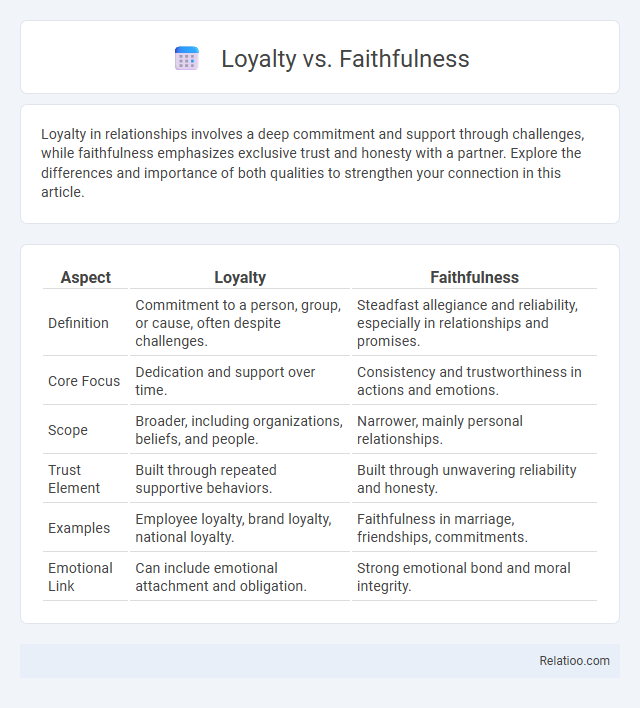Loyalty in relationships involves a deep commitment and support through challenges, while faithfulness emphasizes exclusive trust and honesty with a partner. Explore the differences and importance of both qualities to strengthen your connection in this article.
Table of Comparison
| Aspect | Loyalty | Faithfulness |
|---|---|---|
| Definition | Commitment to a person, group, or cause, often despite challenges. | Steadfast allegiance and reliability, especially in relationships and promises. |
| Core Focus | Dedication and support over time. | Consistency and trustworthiness in actions and emotions. |
| Scope | Broader, including organizations, beliefs, and people. | Narrower, mainly personal relationships. |
| Trust Element | Built through repeated supportive behaviors. | Built through unwavering reliability and honesty. |
| Examples | Employee loyalty, brand loyalty, national loyalty. | Faithfulness in marriage, friendships, commitments. |
| Emotional Link | Can include emotional attachment and obligation. | Strong emotional bond and moral integrity. |
Defining Loyalty and Faithfulness
Loyalty involves a strong commitment or allegiance to a person, group, or cause, often demonstrated through consistent support and reliability, while faithfulness emphasizes unwavering devotion and trust, especially in personal relationships. Your understanding of loyalty highlights dependable actions and fidelity that build lasting connections. Both qualities are essential for fostering trust and integrity in interpersonal and professional bonds.
Key Differences Between Loyalty and Faithfulness
Loyalty refers to a firm allegiance or support toward a person, group, or cause, often demonstrated through actions and decisions that prioritize that connection. Faithfulness emphasizes consistency and reliability, highlighting trustworthiness in remaining true to commitments and promises over time. Understanding these key differences can help you foster stronger relationships by recognizing when to prioritize unwavering support versus steadfast reliability.
Historical Perspectives on Loyalty and Faithfulness
Historical perspectives on loyalty and faithfulness reveal distinct cultural values tied to social and political order; loyalty often aligned with allegiance to rulers, nations, or causes, while faithfulness emphasized personal relationships and moral commitments. Ancient civilizations like Rome prized loyalty as a duty to the state and family, whereas medieval European societies highlighted faithfulness in vows and marriage within chivalric codes. Over time, these concepts intertwined but retained unique roles in defining honor, trust, and social cohesion across different historical contexts.
Psychological Foundations of Loyalty vs Faithfulness
Loyalty is rooted in psychological commitment and emotional bonds, often influenced by social identity and group affiliation, whereas faithfulness emphasizes consistent personal integrity and trustworthiness within individual relationships. Psychological foundations of loyalty include cognitive biases and reward systems that reinforce allegiance to groups or ideas, while faithfulness is more closely tied to moral values and the desire for relational stability. Understanding these distinctions aids in analyzing behaviors in social, organizational, and interpersonal contexts.
Loyalty in Relationships: Pros and Cons
Loyalty in relationships fosters trust, emotional security, and long-term commitment, enhancing mutual support and resilience during challenges. However, excessive loyalty may lead to overlooking personal boundaries, tolerating unhealthy behaviors, or suppressing individual needs. Balancing loyalty with self-respect ensures healthy, sustainable connections without compromising personal well-being.
Faithfulness in Relationships: Pros and Cons
Faithfulness in relationships fosters trust and emotional security, promoting long-term stability and deeper intimacy between partners. However, rigid faithfulness may limit personal growth and adaptation, potentially leading to suppression of individual needs or unexplored opportunities. Balancing faithfulness with open communication is essential to maintain healthy relational dynamics and personal fulfillment.
Loyalty Versus Faithfulness in Friendships
Loyalty in friendships involves a steadfast commitment to support and stand by a friend regardless of circumstances, while faithfulness emphasizes consistently being reliable, truthful, and devoted in maintaining trust. Loyalty often reflects an emotional bond that persists through challenges, whereas faithfulness is demonstrated through consistent actions that uphold the friendship's integrity. Understanding these distinctions enhances the depth and resilience of interpersonal relationships.
Cultural Influences on Loyalty and Faithfulness
Cultural influences significantly shape the concepts of loyalty and faithfulness, with loyalty often tied to collective values and group identity, while faithfulness is frequently associated with personal integrity and commitment. In collectivist societies, loyalty is deeply embedded in social obligations and communal harmony, whereas faithfulness emphasizes trust and steadfastness in interpersonal relationships, reflecting moral or spiritual principles. Understanding these cultural nuances reveals how loyalty and faithfulness are practiced differently across societies, influencing social bonds and ethical behavior.
Loyalty and Faithfulness in the Workplace
Loyalty in the workplace emphasizes commitment to the company's goals and support for leadership, often measured by tenure and willingness to go beyond job duties. Faithfulness centers on reliability and trustworthiness, reflecting consistent ethical behavior and dedication to colleagues and organizational values. Balancing loyalty with faithfulness fosters a productive environment where employees are both dedicated and dependable, enhancing overall team cohesion and performance.
Building Lasting Bonds: Choosing Loyalty or Faithfulness
Building lasting bonds requires a deep understanding of loyalty, faithfulness, and fidelity, each representing distinct yet interconnected commitments. Loyalty emphasizes steadfast support during challenges, while faithfulness highlights unwavering dedication and consistency over time, and fidelity ensures trust through honesty and ethical behavior. Prioritizing these qualities fosters resilient relationships grounded in mutual respect, trust, and enduring emotional connection.

Infographic: Loyalty vs Faithfulness
 relatioo.com
relatioo.com